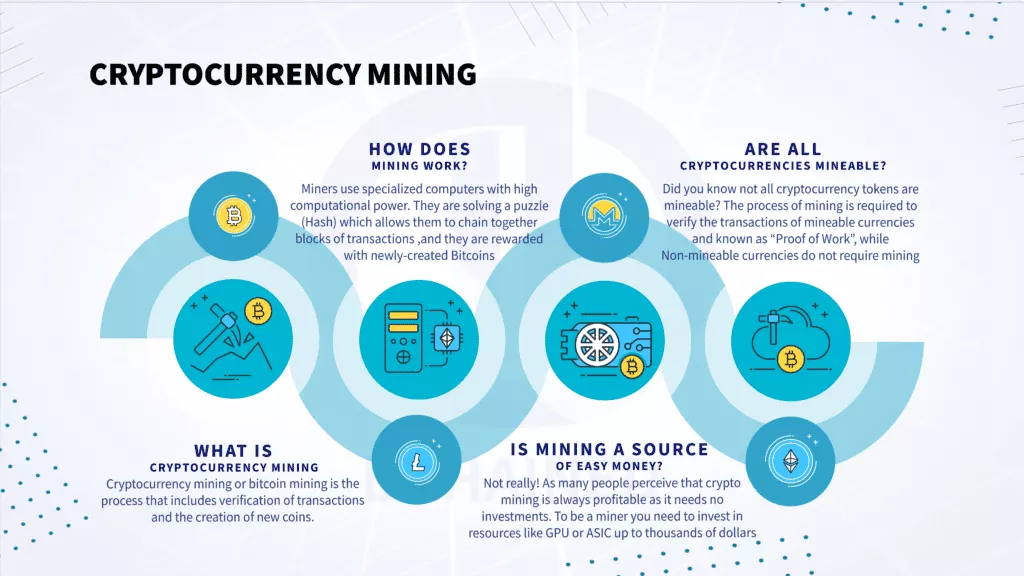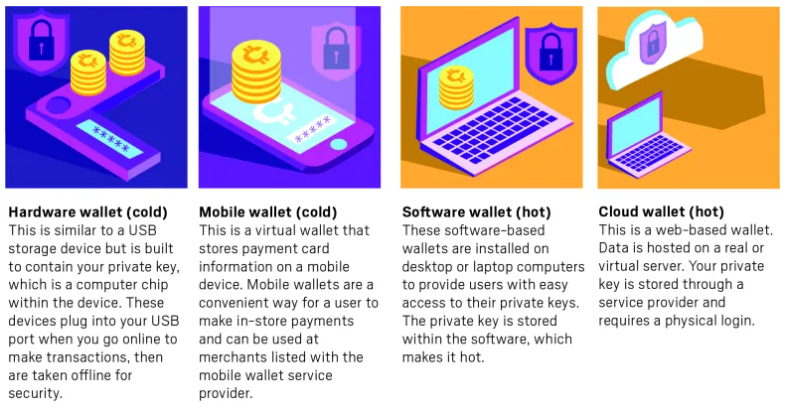Physical Address
304 North Cardinal St.
Dorchester Center, MA 02124
Physical Address
304 North Cardinal St.
Dorchester Center, MA 02124

To understand digital currency, you must first, understand that cryptocurrencies aren’t backed by any government or any central bank.
At least as of this writing, they aren’t! It uses cryptography, which is basically the same technology used for secure communication like email and online banking, to regulate itself. Unlike traditional currencies, which are created by governments and controlled by centralized entities, cryptocurrencies are generated through complex processes called ‘mining.’
In this process, computers use specialized software programs to solve complex mathematical problems. Once solved, the solutions are added to a public record called a blockchain. These blocks then become an important part of the foundation of new cryptocurrencies.
A blockchain is essentially a public ledger where transactions take place amongst a network of computers. It works by having users record transactions on it using cryptography. The blockchain records all transactions chronologically so that they cannot be altered retroactively. This makes it extremely difficult to alter the history of a transaction.
Before you can use cryptocurrency you must create a digital wallet. A digital wallet stores your private keys which allow you access to your funds. Your wallet will usually have an address associated with it. To send coins from one user to another, you need to enter their address into a transaction form. Once this has been done, the recipient receives the amount specified in the transaction. When sending coins, you should always include a small fee to cover the cost of running the network.
Cryptocurrency transactions can take place either peer to peer, by using the address of the wallets or third-party exchanges. These exchanges act as intermediaries between buyers and sellers. Buyers deposit cash or other forms of payment into the exchange’s account. Then, the exchange matches buyers and sellers and facilitates the transfer of funds.

Here are some factors to consider if investing in cryptocurrency:
The price of Bitcoin has soared from mere pennies per coin to nearly $60,000 at its highest to date, but experts warn that investing in cryptocurrency is risky because it’s not backed by any government or central bank. It’s also difficult to predict what will happen to its value.
Currently, cryptocurrency markets are some of the most volatile ones out there. Some people say that they’ll never go back down again, others say they’ll crash and burn. There are many different types of cryptocurrencies and each type has its pros and cons.
Note: this is not financial advice. Do your due diligence and seek financial expert counsel before making decisions like this.
Cryptocurrency is a digital asset designed to work as a medium of exchange using cryptography for security. Bitcoin was the first decentralized digital currency, which means that no single entity controls the supply of bitcoins, nor do they control the network through which transactions are verified. The blockchain technology underlying cryptocurrencies allows for the transfer of funds directly between two parties without going through a financial institution.
The blockchain is shared among all users of bitcoin, so everyone gets access to every transaction that ever took place. This makes it impossible for anyone to change previous records, making it a form of distributed computing.
So bitcoin is a cryptocurrency and cryptocurrency is bitcoin.
Bitcoin is not the only virtual currency out there. There are currently thousands of others including Ethereum, Litecoin, Ripple, Dash, Monero, Zcash, Dogecoin, Peercoin, Primecoin and many more.
If you think about how most of us perform financial transactions today, we are using digital assets like credit cards, PayPal accounts, debit cards, etc. All these are centralized financial institutions where the data is stored in a database controlled by a single entity.
We already live and operate in a virtual environment, albeit, blockchain will absolutely take it to another level!
There are currently over 16 million bitcoins in circulation, with a total market cap of almost $60 billion USD, to date of this writing. There will only ever exist 21 million bitcoin. The most popular cryptocurrencies to date are Bitcoin and Ethereum.
As far as who owns the most bitcoin, it’s actually pretty complicated. If you look at the top 100 addresses, there are a few dozen wallets that have been holding the majority of bitcoin since 2013. These include:
• Coinbase
• Blockchain
• Bitfinex
Satoshi Nakamoto, the elusive father of Bitcoin is estimated to hold 1% of all bitcoin. He mined the coins himself, approximately more than 3,500 BTC during 2009.
He is estimated to hold the largest share of bitcoin.
The first step is to choose which cryptocurrency you want to invest in. This will depend on what you’re looking to achieve from investing. Again I’m not a financial advisor and this is not financial advice, seek professional guidance before making any decisions like this.
If you want to invest in cryptocurrency, there are several ways to do this. You can buy Bitcoin directly through an exchange or purchase it indirectly through an investment fund. Another option is to use a brokerage account. Brokerage accounts allow investors to trade stocks, bonds, commodities, options, futures contracts, currencies, ETFs, mutual funds, and even cryptocurrencies. A third option is to open a digital wallet. Digital wallets are software programs that store your coins offline. They are similar to physical wallets except that they don’t require a paper backup.
A wallet is a place where you store your cryptocurrencies. You need a wallet to spend them. A public key allows someone else to send money to you. Your private key lets you spend those funds. Each cryptocurrency has different types of wallets. Some are desktop apps like Electrum and Mycelium. Others are web-based services like Coinbase or Metamask. And still others are mobile apps like Jaxx and Mist.

Cold wallets, also known as hardware wallets, are the preferred storage for people with large amounts of cryptocurrency. They are offline, meaning they aren’t connected to the internet. Cold wallets are physical devices like USB sticks, paper wallets, or hardware wallets.
Hot wallets are connected to the Internet, most exchanges will offer one for free, but they’re not recommended for storing large amounts of cryptocurrency. Hot wallets are not physically located anywhere; they’re software applications that can be downloaded onto computers or in the cloud (i.e., the Internet).
| Wallet | Type | Pros | Cons |
| Online/Web | Hot | Ease of use; on-the-go transacting | Least secure; risk of downloading viruses |
| Mobile | Hot | Ease of use; on-the-go transactions | Risk for malware and viruses; Loss of assets if you lose your phone |
| Paper | Cold | Not susceptible to hackers; you control your keys | Printing can be tricky; if you lose your printout it can be very hard to access your money |
| Hardware | Cold | Very secure; good for storing large amounts of cryptocurrency | Most expensive type; less convenient for on-the-go transactions |
| Desktop | Hot or Cold | Safer than online or mobile wallets | Less convenient for on-the-go trading and usage; backups of computer required regularly |
What the hell is it good for?
Actually, cryptocurrency is good for a lot of things – but is it real money?
There is no easy answer to this question. Is anything real money? The value of any currency – including crypto – is based on faith. People have to believe that it has value and is accepted as a means of exchange or legal tender.
Some people believe that crypto is the future of money and will ultimately replace fiat currencies. Others believe that it’s nothing more than a digital fad with no intrinsic value.
Personally, I think crypto has a place in the future of money, but it’s far from being a replacement for fiat currencies. It remains to be seen how governments and central banks will react to the rise of crypto and whether they will attempt to regulate or even ban it.
When it comes to cryptocurrency, there are two types of fraud: scams and theft.
Scammers will often create fake websites or online wallets that look like the real thing, in order to trick people into giving them their money. Once they have your money, they will disappear and you will never see it again.
Meanwhile, thieves will try to hack into exchanges or wallets to steal people’s cryptocurrencies. Many of these thefts have been very successful, costing investors millions of dollars.
So how can you protect yourself from cryptocurrency fraud?
The best way is to be vigilant and do your research before investing in any new project. Make sure you only use reputable exchanges and wallets, and be careful about giving out your personal information or private keys to anyone.
Always secure your cryptocurrency offline and in a cold wallet like a Ledger Nano or Trezor, not on a crypto exchange.
These are physical devices that look like a USB thumb drive and they allow you to store your cryptocurrency offline in what’s called “cold storage.” This means that your cryptocurrency is not connected to the internet and therefore it’s much more difficult for hackers to get to.
If something sounds too good to be true, it probably is – so don’t let yourself get scammed!
Cryptocurrency is definitely here to stay. While it may not replace fiat currency just yet, its popularity and acceptance is only going to continue to grow. As someone who is interested in both finance and technology, I find it to be a very exciting development.
I believe that cryptocurrency has a lot of potential and could eventually play a major role in the global economy. However, there are still some challenges that need to be addressed, such as regulation and security. I think it will be interesting to see how these issues are addressed in the coming years.
Please let me know your thoughts on cryptocurrency in the comments below!